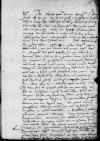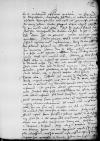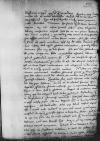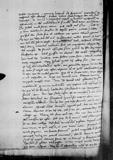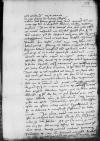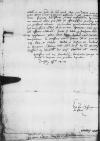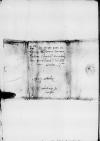Letter #1537
Cornelis DE SCHEPPER to Ioannes DANTISCUSBrussels, 1536-09-13
English register:
De Schepper justifies the year-long break in his correspondence with Dantiscus by his numerous travels and rumours of Dantiscus’ death. These rumours have been quashed by the messenger of the citizens of Gdańsk, inspiring De Schepper to write.
Dantiscus’ previous letter [IDL 1421] reached the Low Countries in De Schepper’s absence, when he was away at King Ferdinand’s court. There he met Piotr Opaliński, envoy of the Polish King [Sigismund I], who told him about Dantiscus’ serious problems with the Castellan(!) of Marienburg [Stanisław Kostka]. The envoy later left for Italy.
When De Schepper returned to Flanders he read Dantiscus’ letter [IDL 1421], then left it in Bruges and set off for Holland. He has not been back since, so he is replying cursorily to the letter due to not having access to the text.
A lot has happened regarding Danish affairs but De Schepper cannot outline the issue extensively because the next day he is already setting off on another journey; he does not know yet whether it will be to join the Emperor [Charles V] in the Provence or to join the war with France at the sea. He assures Dantiscus that nothing will change his respect for him, though for political reasons he does not believe in the possibility of seeing his friend in this life.
De Schepper describes in detail the conflict over the town of Appingedam in Friesland. The town was seized by Meindert van Ham, a mercenary captain alternately operating for the Duke of Guelders [Charles II], the Duke of Holstein [Christian von Oldenburg] and the French. Ham, under siege by the governor of Groningen province, Georg Schenk, received succour from reinforcements sent by the Duke of Holstein, mostly made up of Holstein, Saxon and Gueldrian gentry. Before they reached Appingedam, however, they were crushed by Schenck’s forces under the command of Godschalk [Ericksen], after which Appingedam surrendered. The rebel leaders – Ham and Bernt van Hackfort, a Gueldrian landdrost – are Governor Schenck’s prisoners.
Besieged Copenhagen asked the Emperor for reinforcements; hence a huge fleet was prepared in the Low Countries. Therefore Prince Palatine Friedrich [II von Wittelsbach] also came to Brussels. The opportunity was not used well, though, because Copenhagen surrendered when the troops were engaged in the war with France and in the siege of Appingedam. Since the fleet is ready and armed, the infantry commanded by the Lord of Beveren [Adolf of Burgundy] and [Reinoud] van Brederode are to make their way with it to France. De Schepper and Godschalk [Ericksen] are to join the expedition as the Emperor’s representatives.
De Schepper reports on the military operations of the imperial army, which has reached France by land under the command of the Count of Nassau, the Count of Le Roeulx [Adrien de Croÿ] and the Lord of Praet. The heavily armed soldiers and battle machines scared the French, who shut themselves away in their fortresses. The less well defended ones, including Guise, Bouchain, and Cléry-sur-Somme, were seized in a coup de main, while the stronger ones were left alone. At present, the imperial troops have been laying siege to the excellently fortified and equipped stronghold of Péronne [on the Somme] for about twenty days, counting on provoking the French to fight in the field.
The Duke of Guelders lost Groningen province during this war. He was left only with Twente – a fragment of the Utrecht diocese with the strongholds of Meppel, Coevorden and Wedde. Georg Schenk has already bribed the commander of Wedde and the son of the commander of Coevorden.
The King of France has lost his first-born son [Francis III of Valois], and the Duke of Orléans [Henry II of Valois] is having health problems. France is being ruined more by its own soldiers than by its enemies. The Emperor has reached the Rhône and allegedly has seized Arles.
De Schepper deplores the bad times and the annihilation threatening Christianity. He envies Dantiscus for being far away from the hub of events. He thinks more devout and faithful Christians can currently be found in Turkey than in Denmark or Germany. He doubts whether reforming the Church will prove possible in the face of widespread discord and greatly conflicting views.
De Schepper comments on the rumour about the imprisonment of the Danish bishops and dignitaries with whose help the Duke of Holstein [Christian III of Oldenburg] gained power. He presumes it happened for political reasons, but sees such treatment of bishops in the northern countries as a tendency dangerous for religion, especially after receiving news of the expulsion of bishops from Sweden.
De Schepper informs Dantiscus that following the introduction of a general ban on navigation, the people of Gdańsk wrote a violent and rude letter to the Queen [Mary of Hungary]. He underlines that the ban was lifted even before the letter arrived, and that it had not been targeted at the people of Gdańsk because it had also applied to the English, Portuguese, Scots, Spaniards and the people of the Low Countries. Some ships (including one from Gdańsk) had been requisitioned – in return for compensation – for the needs of the war; the rest had been sent away. Though the offensive and disrespectful tone of the aforementioned letter seems to suggest that the people of Gdańsk are hostile towards the Queen and the Emperor, De Schepper is inclined to put it down to emotions caused by the general unease. The requisitioned Gdańsk ship was turned into a command vessel for the expedition to France. In De Schepper’s view, this is an honour for Gdańsk rather than an insult. Meanwhile, he has received precise orders, so he now knows that he will also be sailing on that ship. Though he is aware of the danger, he is of good heart. He advises Poland to ally with whichever side wants peace. He believes that the Emperor will leave the conflict a victor, with financial and military support from the Low Countries. Various predictions indicate this. Young men in the Low Countries are excellently prepared for military service.
De Schepper would like to see friendship between the Low Countries and Poland so that he might correspond with Dantiscus without arousing suspicion. He advises Dantiscus to take care of his health and enjoy the proximity of his mother [Christina Schultze]. He himself is leaving his wife [Elisabeth Donche] close to the baby’s due date. He sends Dantiscus greetings from her.
In view of the dangerous times, De Schepper has postponed until spring the fulfilment of Dantiscus’ book order. Dantiscus can write to him via the Fuggers. After returning from the expedition he intends to spend the winter with his wife. De Schepper’s wife’s sister [Joanna Donche] and his son [Cornelis jr.] as well as Miklos Oláh send Dantiscus greetings. [Wolfgang] Haller is in Austria, and the Archbishop of Lund [Johan Weze] in Hungary. De Schepper commends himself to Dantiscus’ mother and siblings, his whole family and his valet.
| received [1536]-10-16 Manuscript sources:
Auxiliary sources:
Prints:
| ||||||||||||||
Text & apparatus & commentary Plain text Text & commentary Text & apparatus
 AAWO, AB, D.3, f. [1v] not numbered after 128
AAWO, AB, D.3, f. [1v] not numbered after 128
Reverendissimo in Christo Patri et Domino, domino
Iam annus est, ex quo neque ex me quicquam, neque ego ex te vicissim litterarum accepi. In causa fuit, ut reor, quod nescieris, ubinam locorum fuerim, afui orig. abfui⌈afuiafui orig. abfui⌉ enim ab hac aula[1] frequenter. cf.
Ego vero redii in
Plurima circa rem Danicam[3] erant, de quibus tecum quam paucissimis, abire enim rursus cogor cras atque haud scio, an ad
Novarum autem apud nos rerum quam plurimum est cotidie orig. quotidie⌈cotidiecotidie orig. quotidie⌉que emergit. Dum ego apud serenissimum  AAWO, AB, D.3, f. 125v
nomine venditabat, neque clam fuit, si conatus successisset, his regionibus grande periculum per illum instare occasiones inventurum quaslibet ad nocendum, sed provisum subito fuit. Priusquam tamen succurri potuit, munierat
AAWO, AB, D.3, f. 125v
nomine venditabat, neque clam fuit, si conatus successisset, his regionibus grande periculum per illum instare occasiones inventurum quaslibet ad nocendum, sed provisum subito fuit. Priusquam tamen succurri potuit, munierat
Gestum est id die quinta Augusti, quo tempore cum orig. qu[u]m⌈cumcum orig. qu[u]m⌉ obsessos speraremus deditionem facturos, frustrati spe sumus atque opinione diutius tenuerunt. Demum pertinacia victa est seque die sexta huius mensis dedidere iis pactis, ut milites incolumes relictis bonis armisque, virga alba tantum egrederentur, duces suos, hoc est praefatum  AAWO, AB, D.3, f. 126r
bat et anababtisticam resuscitare conabatur, et
AAWO, AB, D.3, f. 126r
bat et anababtisticam resuscitare conabatur, et
Parte alia illustres domini comites  AAWO, AB, D.3, f. 126v
ut minarum iraeque memor acie contendat. Sedere ante id oppidum iam diebus, ni fallor, viginti aut circiter bombardisque et machinis valde laceravere, nonnumquam tentantes, an per occasionem expugnare possent, sed non ita facile est inexpugnabili urbi atque instructissimae iugum inicere orig. iniicere⌈inicereinicere orig. iniicere⌉. Neque tamen Gallus adhuc aliquis comparuit. Iam instat hiems neque tamen remittit impetus nostrorum adeo, ut omnino videatur futurum, ut non nisi cum alterius partis excidio bellum finiatur.
AAWO, AB, D.3, f. 126v
ut minarum iraeque memor acie contendat. Sedere ante id oppidum iam diebus, ni fallor, viginti aut circiter bombardisque et machinis valde laceravere, nonnumquam tentantes, an per occasionem expugnare possent, sed non ita facile est inexpugnabili urbi atque instructissimae iugum inicere orig. iniicere⌈inicereinicere orig. iniicere⌉. Neque tamen Gallus adhuc aliquis comparuit. Iam instat hiems neque tamen remittit impetus nostrorum adeo, ut omnino videatur futurum, ut non nisi cum alterius partis excidio bellum finiatur.
Quocumque oculos corporis mentisque vertimus, plena omnia sunt tumultuum, seditionum, cladium, pavoris, infidelitatis, impietatis. Lugere lubet religionem nostram Christianam exstinctam orig. extinctam⌈exstinctamexstinctam orig. extinctam⌉ plane non ibi modo, quo vix loco umquam orig. unquam⌈umquamumquam orig. unquam⌉ fuit, sed ubique. Avaritiae, libidini nullus limes, nulla meta constituta, quo fit, ut vere diu praesagiverimus futura tempora, in quibus abesse quam adesse optandum foret magis. Tu interim in otio orig. ocio⌈otiootio orig. ocio⌉ tuo felix, si modo felicitas orig. foelicitas⌈felicitasfelicitas orig. foelicitas⌉ aliqua est multa videre, quae
 AAWO, AB, D.3, f. 127r
deplorare magis possis, quam emendare. Qualia, non dubito, multa tibi ob oculos obversari, etiamsi ab aula es remotissimus. Ego ab his scopulis nondum potui navim meam divertere, nimirum hoc saeculo orig. seculo⌈saeculosaeculo orig. seculo⌉, quod totum hominem requirit. Quod nisi nostra iuvenum adhuc opera, diligentia laboreque prospiciatur reipublicae, haud scio, an non plane deserenda erit navis custodia permittendaque vela ventis et tempestatibus. Quae res, ut patientius multa feram, monet. Sed haec alias.
AAWO, AB, D.3, f. 127r
deplorare magis possis, quam emendare. Qualia, non dubito, multa tibi ob oculos obversari, etiamsi ab aula es remotissimus. Ego ab his scopulis nondum potui navim meam divertere, nimirum hoc saeculo orig. seculo⌈saeculosaeculo orig. seculo⌉, quod totum hominem requirit. Quod nisi nostra iuvenum adhuc opera, diligentia laboreque prospiciatur reipublicae, haud scio, an non plane deserenda erit navis custodia permittendaque vela ventis et tempestatibus. Quae res, ut patientius multa feram, monet. Sed haec alias.
Venio ad tertium membrum cf.
Ad  AAWO, AB, D.3, f. 127v
de fide Christiana rerumque habenas ad fugitivos monachos et apostatas esse redactas. Quare valere sinamus regna illa cum suis toparchis, et nos, quae a maioribus nostris per manus accepimus, ea retineamus, in illis consenescamus, si modo Deus vitam annuerit.
AAWO, AB, D.3, f. 127v
de fide Christiana rerumque habenas ad fugitivos monachos et apostatas esse redactas. Quare valere sinamus regna illa cum suis toparchis, et nos, quae a maioribus nostris per manus accepimus, ea retineamus, in illis consenescamus, si modo Deus vitam annuerit.
En habes omnem seriem rerum, quae apud nos sunt.
Quae ad te scripta volui, nam
Quicquid tamen exinde sequetur, nos fortiter feremus, quibus magnitudo et fortuna  AAWO, AB, D.3, f. 128r
inulti peribimus atque, ut poeta ait,
cf. Verg. A. spargimus, et nostro sequitur de vulnere sanguis 12.51 ⌊et nostro sequitur de vulnere sanguiscf. Verg. A. spargimus, et nostro sequitur de vulnere sanguis 12.51 ⌋. Necdum adeo fortunae paenitet certique sumus
AAWO, AB, D.3, f. 128r
inulti peribimus atque, ut poeta ait,
cf. Verg. A. spargimus, et nostro sequitur de vulnere sanguis 12.51 ⌊et nostro sequitur de vulnere sanguiscf. Verg. A. spargimus, et nostro sequitur de vulnere sanguis 12.51 ⌋. Necdum adeo fortunae paenitet certique sumus
In summa, cuperem inter nos et vos amicitiam esse, ut nobis viris bonis liceat subinde sine suspicione orig. suspitione⌈suspicionesuspicione orig. suspitione⌉ mutuo per litteras fabulari. Quae, quo sit minus, per nos certe non stat, sed vos non desinitis ab expugnatione, quod aiunt,  AAWO, AB, D.3, f. 128v
clades in ore. Sed de his nimis, dum me detinet amor pacis, quam optare magis, quam sperare possumus.
AAWO, AB, D.3, f. 128v
clades in ore. Sed de his nimis, dum me detinet amor pacis, quam optare magis, quam sperare possumus.
Tu interim valetudinem hidden by binding⌈[nem]nem hidden by binding⌉ cura fruareque dulcissimae
Libros, quorum mentionem facis, nolui his iniquissimis temporibus ad te mittere. Proximo vere, quo sese hidden by binding⌈[e]e hidden by binding⌉ res efferent, videbimus. Scribe, si lubet, per
Salutat item te
Iterum vale, Domine et Pater ex animo honorande.
Ocissime orig. Ocyssime⌈OcissimeOcissime orig. Ocyssime⌉ ex
Eiusdem Reverendissimae Dominationis Vestrae ex animo inservitor, amicus hidden by binding⌈[us]us hidden by binding⌉ et filius
Postscript:
Dulcissimae
